 Advocate Communications Policy v2.0
Summary
Objective
Advocate Communications Policy v2.0
Summary
Objective
An advocate is someone who acts on behalf of a client. They may get involved when a client wishes to be supported while working
with ACC.
Clients can request that another person, eg an advocate, relative or friend, act on their behalf when dealing with a claim by com-
pleting an ACC5937 Authority to act form, which is added to their party record in Eos.
Owner
Luanne Razak
Expert
Lucy McKimm
Policy
1.0 Legislation
a The following legislation and codes govern our communications with client advocates:
Health Information Privacy Code 1994.pdf
Code of ACC Claimants’ Rights.pdf
Privacy Act 1993
https://www.westlaw.co.nz/maf/wlnz/app/document?
docguid=I544316c2e02c11e08eefa443f89988a0&tocDs=AUNZ_NZ_LEGCOMM_TOC&isTocNav=true
2.0 Community advocacy
a ACC has a contract with three suppliers to provide a community advocacy service to ACC clients. These providers are:
• WayFinders
• Whanau Ora Commissioning Agency (WOCA)
• Workplace Injury Advocacy Service (WIAS)
The free service helps clients quickly resolve issues they have with ACC through high quality independent client advocacy. It is
available throughout the country, using the following 0800 phone numbers:
• WayFinders: 0800 273 030
• Whanau Ora Commissioning Agency: 0800 222 924
• Workplace Injury Advocacy Service: 0800 486 466
3.0 Advocacy groups and ACC
a ACC works in partnership with advocates and advocacy services through the Voice of the Customer (VoC) programme, to
ensure that the voice of the customer is heard and recognised by ACC. You can email the programme manager directly at
[email address].
They:
• work with advocacy organisations to improve the quality and availability of advocacy services for ACC clients
• coordinate the ACC Consumers’ Outlook Group (a group of people who talk to ACC as representatives of the wider com-
munity)
• coordinate the Older People Advisory Group (OPAG), which is particularly concerned with injury issues for older people in the
community.
ACC > Claims Management > Manage Client Information > Operational Policies > Client rights > Advocate Communications Policy
Uncontrolled Copy Only : Version 2.0 : Last Edited Thursday, October 24, 2019 9:16 AM : Printed Thursday, July 9, 2020 9:15 AM
Page 1 of 2
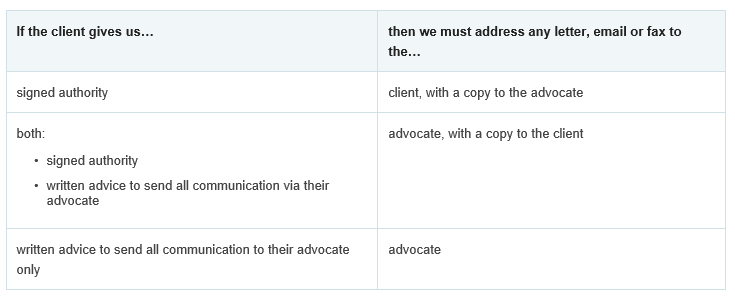 4.0 Written communication
4.0 Written communication
Written communication.PNG
5.0 Telephone communication
a You must make telephone contact with the advocate acting for the client, not with the client.
6.0 Exception
a Court order provisions take precedence over these rules, eg Protection of Personal Property and Rights Orders.
When there is a Court order in place, we must comply with its provisions.
ACC > Claims Management > Manage Client Information > Operational Policies > Client rights > Advocate Communications Policy
Uncontrolled Copy Only : Version 2.0 : Last Edited Thursday, October 24, 2019 9:16 AM : Printed Thursday, July 9, 2020 9:15 AM
Page 2 of 2
 Client Legislative Rights and Responsibilities Policy v5.0
Summary
Objective
Client Legislative Rights and Responsibilities Policy v5.0
Summary
Objective
This page describes the rights and responsibilities of clients when they make a claim with us. It includes specific legislation, protec-
tion of information, representation and human rights issues. This information will help you to comply with the legislative requirements
when dealing with client claims.
Owner
Cheryl Gall
Expert
Cheryl Gall
Policy
1.0 Rules
a The following rules cover:
• client rights
• client responsibilities
• cultural differences
• communication
• guidelines for human rights issues
• guidelines for privacy issues.
2.0 Cost of support
a Clients have the right to have the support they are eligible for funded by ACC to the maximum extent possible. We'll cover the
majority of costs of required assessments and other necessary rehabilitation interventions. Sometimes, however, the regulated
limit of our contribution does not match the entire amount charged by the provider and so the client must also make a contri-
bution, as a part-charge or surcharge.
A part-charge may be incurred when:
• the client’s general practitioner (GP) charges more for a consultation than we're able to pay under the regulations. The client
can be charged by the provider for the additional amount
• the client was intending to pay a particular treatment cost, but an injury has increased the treatment necessary. We'll pay only
for that proportion of the treatment that is necessary to address the injury
• the client wants a more expensive intervention than we consider is necessary to address the injury. We'll pay the basic cost
sufficient to address the assessed need, and the client can choose to pay for an ‘upgrade’.
3.0 Representation and support
a The client has the right to bring friends, family members, whānau or other representatives with them for support whenever they
meet with us or with an assessor or service provider. They don't have to explain or justify their reasons for this.
4.0 Information protection
a All information about the client is protected under the:
Privacy Act 1993
https://www.westlaw.co.nz/maf/wlnz/app/document?
docguid=I544316c2e02c11e08eefa443f89988a0&isTocNav=true&tocDs=AUNZ_NZ_LEGCOMM_TOC&startChunk=1&en
dChunk=1
Health Information Privacy Code 1994.
https://privacy.org.nz/forums-and-seminars/health-information-privacy-code/
5.0 Information about our decisions
a The client has the right to access all the information about decisions we make on their rehabilitation. We need to clearly ex-
plain why we consider any course of action appropriate.
ACC > Claims Management > Manage Client Information > Operational Policies > Client rights > Client Legislative Rights and Responsibilities Policy
Uncontrolled Copy Only : Version 5.0 : Last Edited Tuesday, November 19, 2019 9:50 AM : Printed Thursday, July 9, 2020 9:16 AM
Page 1 of 4
6.0 Informing the client
a Use the VOCIS130 Returning to work after an injury information sheet to provide the client with information about their rights
and responsibilities for their vocational rehabilitation.
VOCIS130 Returning to work after an injury
b If you’re working in Next Generation Case Management, refer to the guidelines below on when and how to inform clients of
their rights and responsibilities.
NG GUIDELINES Client Legislative Rights and Responsibilities
http://intra.ds.acc.co.nz/intra/groups/both_informe/documents/resources_and_tools/ts182579.docx
7.0 Reasonable time to consider
a We must allow the client a reasonable amount of time to consider information we provide to them, before they make any deci-
sions based on it. We need to provide them with the relevant information as early as possible and make sure they fully under-
stand it before we ask them to decide or agree to it.
8.0 Challenging decisions
a The client has the right to challenge any decision they disagree with, or the results of any assessment. If they do we must look
seriously at whether agreement is possible. This can include getting opinions from others or revisiting the decision-making
process. We must make a serious effort to reach agreement and will only defend our decision at review if agreement is unable
to be reached.
9.0 Client’s responsibility to participate in rehabilitation
a The client is responsible for as much of their own rehabilitation as they can achieve, considering the injury. In terms of the
rehabilitation process, we expect them to:
• participate in all stages of developing their individual rehabilitation plan (IRP)
• attend assessment appointments
• carry out their part of any agreed interventions
• avoid activities that they agree are counterproductive to achieving the outcome.
We enable them to do this by discussing the outcome and each planned intervention as the rehabilitation progresses and
asking them to sign off each version of the IRP. This represents their commitment to meet the responsibilities they've agreed
to. If the client refuses to participate, without reasonable grounds, we aren’t obliged to provide those interventions to them.
10.0 If the client does not meet their responsibilities
a We can withhold support for the client if, without good reason, they:
• fail to comply with any requirements of the legislation related to their claim
• refuse to undergo medical or surgical treatment that will assist their recovery from injury
• fail to comply with what they agreed in their IRP.
11.0 Cultural differences - ACC policies
a We have established partnership relationships with Māori who have participated, and continue to participate in developing,
monitoring and evaluating all areas of our case management processes. This includes:
• developing culturally appropriate practices and procedures, eg it's appropriate to involve the client’s whānau in developing an
IRP
• encouraging more Māori participation in our organisation
• prioritising our resource allocations to take account of Māori health needs and perspectives
• reporting on indicators about our responsiveness to Māori in the annual service agreement report to the Minister for ACC.
12.0 How this affects what we do
a Our policies recognise the multicultural nature of our society. This is important in how we manage clients’ cases, particularly
rehabilitation, because we have to be able to show we’ve taken account of each client’s cultural differences.
By being aware of and accepting our differences, we can respond appropriately to meet our requirements and clients’ needs
under the legislation.
ACC > Claims Management > Manage Client Information > Operational Policies > Client rights > Client Legislative Rights and Responsibilities Policy
Uncontrolled Copy Only : Version 5.0 : Last Edited Tuesday, November 19, 2019 9:50 AM : Printed Thursday, July 9, 2020 9:16 AM
Page 2 of 4
13.0 How to comply with this policy
a You must:
• actively recognise, acknowledge and respect the differences between people, regardless of their age, gender, ethnicity, reli-
gion, socio-economic status, sexual orientation or ability
• identify your own response to these differences
• work collaboratively and cooperate with people who are different from you in these ways
• behave in a way that doesn’t discriminate against them because of these differences.
14.0 Communication issues
a ACC is committed to communicating with clients so we:
• empower them to identify their own cultural identity and communication needs
• identify sources of cultural expertise and support for them, such as their extended family, religious groups, community
groups, national organisations, ACC’s Cultural Case Advisors etc
• ensure we spell and pronounce their names correctly
• ensure that any information exchanged has been clearly understood by all parties involved.
15.0 Guidelines for human rights issues
a All legislation and civil practice, including our case management processes, must comply with the public law rights contained in
the:
• Human Rights Act 1993
• New Zealand Bill of Rights Act 1990.
You must be sufficiently familiar with this legislation to ensure you comply with it.
16.0 Code of Health and Disability Rights
Code of Health and Disability Services Consumers’ Rights
https://www.westlaw.co.nz/maf/wlnz/app/document?
startChunk=1&endChunk=1&docguid=Ia7e35599e03f11e08eefa443f89988a0
17.0 Guidelines for privacy issues
a The Privacy Act 1993 (Privacy Act) and Health Information Privacy Code 1994 (the Code) control how we deal with personal
information about the client, including:
• how we collect, store and dispose of information
• how we access the information
• who has access to the information
• the client’s right to access the information and correct it.
The Privacy Act covers all personal information while the Code focuses on personal health information.
They govern all situations where we:
• collect information about the client from them
• collect information about the client from others
• provide information about the client to others
• use information about the client for our own processes and procedures.
Privacy Act 1993
https://www.westlaw.co.nz/maf/wlnz/app/document?
docguid=I544316c2e02c11e08eefa443f89988a0&tocDs=AUNZ_NZ_LEGCOMM_TOC&isTocNav=true
18.0 Dealing with requests for information
a If you receive a request for personal information about a client, from anyone other than the client, you must comply with the
requirements of the Privacy Act when you respond.
ACC > Claims Management > Manage Client Information > Operational Policies > Client rights > Client Legislative Rights and Responsibilities Policy
Uncontrolled Copy Only : Version 5.0 : Last Edited Tuesday, November 19, 2019 9:50 AM : Printed Thursday, July 9, 2020 9:16 AM
Page 3 of 4
19.0 Specific requirements
a When dealing with personal information about a rehabilitation client you must:
• ask the client to provide the information themselves wherever possible, to make sure that it’s as accurate as possible
• ask the client to confirm that any information provided by anyone else is accurate and complete, and to correct it if it’s incor-
rect
• record any client-requested correction you disagree with and the reasons why you did not make the change
• only collect information for the purpose of processing the claim
• dispose of securely, preferably by shredding, any information that is no longer required
• store all personal information securely, so that only authorised people can access it
• not give anyone permission to access the information unless they’re permitted to under the Privacy Act
• ask the client for written authority to let someone else have access to the information.
ACC > Claims Management > Manage Client Information > Operational Policies > Client rights > Client Legislative Rights and Responsibilities Policy
Uncontrolled Copy Only : Version 5.0 : Last Edited Tuesday, November 19, 2019 9:50 AM : Printed Thursday, July 9, 2020 9:16 AM
Page 4 of 4
 Clients opting out of research Policy v2.0
Summary
Objective
Clients opting out of research Policy v2.0
Summary
Objective
We use Research New Zealand (RNZ) to do our customer satisfaction surveys. If a client doesn’t want to participate in these surveys
they must be added to the research exclusion database. ACC’s Governance, Policy and Research unit/team maintain this register of
excluded clients so those who opt out of research aren’t contacted and their information isn’t shared.
Owner
Cheryl Gall
Expert
Cheryl Gall
Policy
1.0 Rules
a When a client tells ACC they don’t want to be involved in ACC initiated research, the staff member must:
• record the conversation they’ve had with the client by adding a note in the contact tab in Eos
• and add the Party Flag ‘Exclude from Client Research’.
Contact
http://thesauce/team-spaces/eos-online-help/contact/contact/index.htm
Add a party flag
http://thesauce/team-spaces/eos-online-help/managing-work/parties/working-with-parties/add-a-party-flag/index.htm
2.0 Business Intelligence
a Business Intelligence uses the Eos information to add the client to the research exclusion database which ensures the client
isn’t selected to participate in research.
ACC > Claims Management > Manage Client Information > Operational Policies > Client rights > Clients opting out of research Policy
Uncontrolled Copy Only : Version 2.0 : Last Edited Thursday, June 20, 2019 11:44 AM : Printed Thursday, July 9, 2020 9:18 AM
Page 1 of 1
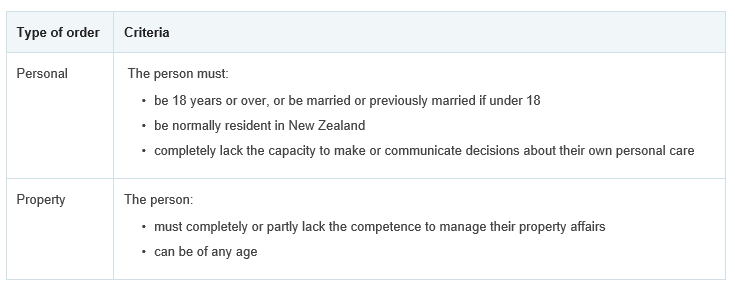
 Personal and Property Orders for Clients Policy v3.0
Summary
Objective
Personal and Property Orders for Clients Policy v3.0
Summary
Objective
The following rules apply to adult clients over 18 who are receiving case management and are likely to continue receiving it. They
may find it difficult to manage their own affairs.
These rules do not apply to clients receiving rehabilitation or entitlements for a short period only.
Owner
Mike Mercier
Expert
Mike Mercier
Policy
1.0 Clients unable to manage their affairs
a If a client is no longer able to make decisions for themselves, relatives and others can apply to the Family Court under the
Protection of Personal and Property Rights Act 1988 (PPPR Act) to make a personal order or property order for the client.
Alternatively, the Court can be asked to appoint a welfare guardian or property manager to make decisions for the client.
2.0 Payments to children
a We have a separate policy for payments to children. For more information, see either:
• Who to pay,‘Payments for children under 16 years’
• Single payment option, ‘Special cases’, if you need information about the independence allowance single payment option for
a child under 18 years.
Who to Pay
Single Payment Option Policy
3.0 Youths with an intellectual disability or cognitive impairment
a The PPPR Act also applies to parents of children who have an intellectual disability or cognitive impairment rendering them
unable to make decisions for themselves once they turn 18. Until a child reaches 18, parents as guardians can make decisions
on behalf of their children. Once a child turns 18, Section 28 of the Care of Children Act 2004 says parents cease to be guar-
dians. This means parents no longer make decisions for their children.
Serious injury coordinators must provide families with this information before a child’s 18th birthday.
4.0 Criteria for creating an order
a For a personal or property order to be created the person must generally satisfy the criteria in the attached table.
Criteria for creating an order.PNG
ACC > Claims Management > Manage Client Information > Operational Policies > Client rights > Personal and Property Orders for Clients Policy
Uncontrolled Copy Only : Version 3.0 : Last Edited Wednesday, August 7, 2019 12:54 PM : Printed Thursday, July 9, 2020 9:19 AM
Page 1 of 3
5.0 Identifying the option of application
a Serious injury coordinators or case managers must be careful when identifying the option of applying for a personal or property
order. The Court regards making a personal or property order for someone as a serious step.
You must understand and carefully consider the criteria for creating an order before discussing the option of an application with
a client or their representative.
You must focus on the client’s ability to make decisions about their personal or property affairs, not the quality of those deci-
sions. That is, focus on whether the client can understand the nature of their decisions and foresee the consequences, not
whether the client makes decisions that an average person would or would not make.
6.0 Clients with a new traumatic brain injury
a We must wait at least three months for the new traumatic brain injury (TBI) to stabilise before identifying the option of applying
for a personal or property order.
The one exception to this rule is where you have serious concerns about the client’s personal welfare or property affairs, eg
the client’s ability to manage a lump sum that is due to be paid. In these cases you may need to identify the option of an appli-
cation sooner.
7.0 Information about personal and property orders
a The Serious injury coordinator or case manager can give the client and their representative the following information, if prac-
ticable:
• SIIS1 Personal and property orders (97K) information sheet
• The Protection of Personal and Property Rights Act 1988 booklet, available from a local Family Court.
The client or their representative can contact a local Family Court for more information about personal and property orders.
SIIS1 Personal and property orders
8.0 Who can apply for an order?
a ACC cannot make an application for a personal or property order. The client and their representative should contact a local
Family Court for advice on making an application or who can apply.
Alternatively, a client might have appointed someone (called an attorney) to make decisions for the client, just in case the client
ever became unable to make his or her own decisions, under a document called an enduring power of attorney. This gives the
client more control over what happens than when someone else applies for a personal or property order after the incapacity
begins.
An attorney can make minor decisions about the client’s personal care on the attorney’s own judgement. To make decisions
about the client’s property, or significant decisions about the client’s personal care, the attorney needs a health practitioner
(who can be a GP or a relevantly qualified specialist) or a court to certify the client’s incapacity. ACC needs to see the enduring
power of attorney and the certificate before dealing with the attorney on the client’s behalf.
Refer to Ministry of Justice website Powers to Make Decisions for Others for descriptions of the differences between enduring
powers of attorney and personal and property orders.
Powers to Make Decisions for Others
https://www.justice.govt.nz/family/
ACC > Claims Management > Manage Client Information > Operational Policies > Client rights > Personal and Property Orders for Clients Policy
Uncontrolled Copy Only : Version 3.0 : Last Edited Wednesday, August 7, 2019 12:54 PM : Printed Thursday, July 9, 2020 9:19 AM
Page 2 of 3
9.0 Application costs
a We'll contribute towards the costs of an order application, or to bring an enduring power of attorney into effect, if both:
• the client is receiving and likely to continue to receive case management in the foreseeable future
• the client is 18 years or older.
We do not contribute towards the ongoing costs of the order.
We'll consider each request to pay costs on a case-by-case basis, regardless of whether an order is made or not.
We'll contribute towards the following costs relating to an application:
• specialist report. This includes a neuropsychological, psychiatric or geriatric report, if one has not already been obtained
• other medical report. We pay the client’s medical practitioner a set rate of $140 per hour to complete the report, or a propor-
tion of that amount if the report is completed in less than an hour
• legal fees. These will vary depending on the work involved in making an application. A typical range is between approximately
$750 and $3,000 but is not limited to these amounts. These amounts are based on private solicitor and Public Trust charges
and are a guide only. If there is uncertainty about the legal fees, ask for a breakdown of costs.
We will not pay for:
• commission, expenses and other charges incurred by the Public Trust or Māori Trustee if they are the property manager
• ongoing expenses incurred by the client’s welfare guardian, property manager or property administrator.
Always get original receipts or invoices and, if necessary, ask for a breakdown of the costs.
ACC will contribute towards the costs of a medical certificate to bring an enduring power of attorney into effect. It can also
contribute to legal fees if it is necessary to apply to a court.
10.0 Payment code
a Costs related to an application should be paid under the payment code SIPPO: Legal Costs for Property and Personal Order
Applications.
11.0 Renewing an order
a The Court usually sets a date on which the order will end or be renewed. We do not apply to renew an order or decision.
We'll consider contributing towards the costs of making an application to renew an order or decision, on a case-by-case basis
where:
• the client is receiving ongoing entitlements such as rehabilitation or weekly compensation
• an order is required for ACC to administer the claim, ie there needs to be someone with authority to act on the client’s behalf
when it relates to their ongoing rehabilitation and payments.
We expect that the cost of renewing an order will be less than the initial costs because the Criteria for creating an order have
already been met. You must ask the property manager to get a cost estimate before agreeing to a contribution from ACC.
ACC > Claims Management > Manage Client Information > Operational Policies > Client rights > Personal and Property Orders for Clients Policy
Uncontrolled Copy Only : Version 3.0 : Last Edited Wednesday, August 7, 2019 12:54 PM : Printed Thursday, July 9, 2020 9:19 AM
Page 3 of 3
 Request for Access Log/Footprint Report Policy v5.0
Summary
Objective
Request for Access Log/Footprint Report Policy v5.0
Summary
Objective
Access logs, also known as footprint reports, are spreadsheets ACC generates to show each individual access by staff to a client’s
claim file or party record in Eos. The access log has limited information about actions relating to a claim, and includes all types of
contacts such as contacts for payments, auditing, or actuarial analysis.
Access logs show the staff member’s job title and department they’re in at the time the report was run. There are also many roles in
ACC that require legitimate access to Eos data, such as mail room staff, Government Services advisors, or data analysts. For these
reasons, it’s appropriate to explain why particular areas and roles need to access Eos.
Owner
John Sullivan
Expert
Nurul Sultan
Policy
1.0 Rules
a Access logs, also known as footprint reports, are spreadsheets ACC generates to show each individual access by staff to a
client’s claim file or party record in Eos. The access log has limited information about actions relating to a claim, and includes
all types of contacts such as contacts for payments, auditing, or actuarial analysis.
In the past, ACC has refused requests for access logs on the grounds that the information is trivial. However, the Privacy
Commissioner has determined that this approach is incorrect. People have a right to information about themselves, which can
include knowing who has accessed or amended their file.
Access logs show the staff member’s job title and department they’re in at the time the report was run. There are also many
roles in ACC that require legitimate access to Eos data, such as mail room staff, Government Services advisors, or data ana-
lysts. For these reasons, it’s appropriate to explain why particular areas and roles need to access Eos.
If a client raises concerns that a staff member may have inappropriately accessed their file, you must:
• work out why, i.e. they may have a mutual acquaintance that appears to know information relating to their claim
• advise the client that ACC will assess their specific claims and will advise them if we are able to substantiate their concerns
• advise the client that if any access of concern is found it will be addressed internally as a breach of ACC’s Code of Conduct
• discuss this with your manager or the Privacy Team before arranging to request the access log through a People Consultant
• have a People Consultant inspect the access log to assess the validity of the client's concerns, and let you know the results
• work with your People Consultant to take actions regarding any inappropriate staff access
• contact the Privacy Team to discuss the appropriate response to the client.
If the client recently requested a copy of their file, explain to them they will see all meaningful access to their file by staff mem-
bers. If the client has not recently received a copy of their file, suggest to them that they do so.
ACC > Claims Management > Manage Client Information > Operational Policies > Client privacy > Request for Access Log/Footprint Report Policy
Uncontrolled Copy Only : Version 5.0 : Last Edited Monday, January 27, 2020 1:24 PM : Printed Thursday, July 9, 2020 9:13 AM
Page 1 of 1
 Service delivery expectations Policy v2.0
Summary
Objective
Service delivery expectations Policy v2.0
Summary
Objective
ACC strives to provide a high standard of customer service at all times, as required by our legislation. We must meet clients’ reason-
able expectations and deliver the highest practicable standards of service and fairness. The Code of ACC Claimants’ Rights was
established so clients understand what they can expect from ACC. Our customer service commitment includes providing a timely re-
sponse to telephone calls and correspondence.
Owner
Cheryl Gall
Expert
Cheryl Gall
Policy
1.0 Rules
a The following guidelines state the agreed maximum timeframes for case and claims management staff responding to tele-
phone calls and written correspondence:
• You must return all telephone calls within 24 hours or the equivalent of 1 working day
• You must reply to all written correspondence within 7 days
• You must reply to all emails within 48 hours (2 working days) of receiving them. This includes sending an interim acknowl-
edgement if a formal written response is required. An interim response must include the timeframe in which the final response
will be sent.
ACC > Claims Management > Manage Client Information > Operational Policies > Client rights > Service delivery expectations Policy
Uncontrolled Copy Only : Version 2.0 : Last Edited Tuesday, November 19, 2019 9:50 AM : Printed Thursday, July 9, 2020 9:20 AM
Page 1 of 1
 Transitional Provisions Policy v3.0
Summary
Objective
Transitional Provisions Policy v3.0
Summary
Objective
The Accident Compensation (AC) Act 2001 and the Injury Prevention, Rehabilitation, and Compensation (Ancillary Services) Regu-
lations 2002 came into force on 1 April 2002.
Owner
Tui Kailahi
Expert
Deborah Doroshuk
Policy
1.0 Rules
a We must consider all requests for ancillary services received on or after 1 April 2002 under the AC Act 2001 and the 2002
regulations.
The date of injury or date of claim lodgement is not relevant for ancillary services.
If prior approval for ancillary services was requested before 1 April 2002 and the payment rate is specified in the client’s indi-
vidual rehabilitation plan (IRP), the payment rate for the services covered by that prior approval is as agreed in the IRP.
If travel and accommodation took place before 1 April 2002 the payment rate is as provided for in the legislation and regu-
lations in force at the time.
If a client was eligible for transport assistance both before and after 1 April 2002, the rate of payment may change depending
on the specific type of support and how the assistance is described in the IRP.
Transport allowance indexation (1998 & 1992 Acts)
http://thesauce/team-spaces/chips/treatment-rehabilitation/ancillary-services/reference/transport-allowance-
indexation-1998--1992-acts/index.htm
ACC > Claims Management > Manage Claims > Operational Policies > Treatment and Rehabilitation > Ancillary services > Transitional Provisions Policy
Uncontrolled Copy Only : Version 3.0 : Last Edited Wednesday, November 28, 2018 2:02 PM : Printed Thursday, July 9, 2020 9:10 AM
Page 1 of 1
 Which Act to Use Policy v10.0
Summary
Objective
Which Act to Use Policy v10.0
Summary
Objective
Refer to this guidance to help you apply the Transitional Provisions set out in Part 11 of the Accident Compensation Act 2001.
1) Claims accepted under former Acts
2) Cover for claims lodged under former Acts
3) Date of lodgement
4) Incorrect cover decisions
5) Exclusions
Background
Transitional provisions:
• determine, under the Accident Compensation Act 2001, whether a person has cover for a personal injury suffered before 1 April
2002, but may involve applying a previous Act
• determine eligibility for support, for claims accepted for cover for injuries suffered before 1 April 2002.
Owner
Martin Shelton
Expert
Deborah Doroshuk
Policy
1.0 Claims accepted under former Acts
a A person continues to have cover under the Accident Compensation Act 2001 if their claim for cover was accepted before 1
April 2002.
2.0 Cover for claims lodged under former Acts
a Use the attached table to work out which Act to use, based on the date of injury and lodgement. In some circumstances a
client may only have cover under the current Act, or if they meet the criteria, cover under previous Acts.
ACC > Claims Management > Manage Claim Registration and Cover Decision > Operational Policies > Cover Decision > Which Act to Use Policy
Uncontrolled Copy Only : Version 10.0 : Last Edited Tuesday, December 24, 2019 7:47 AM : Printed Thursday, July 9, 2020 9:26 AM
Page 1 of 4
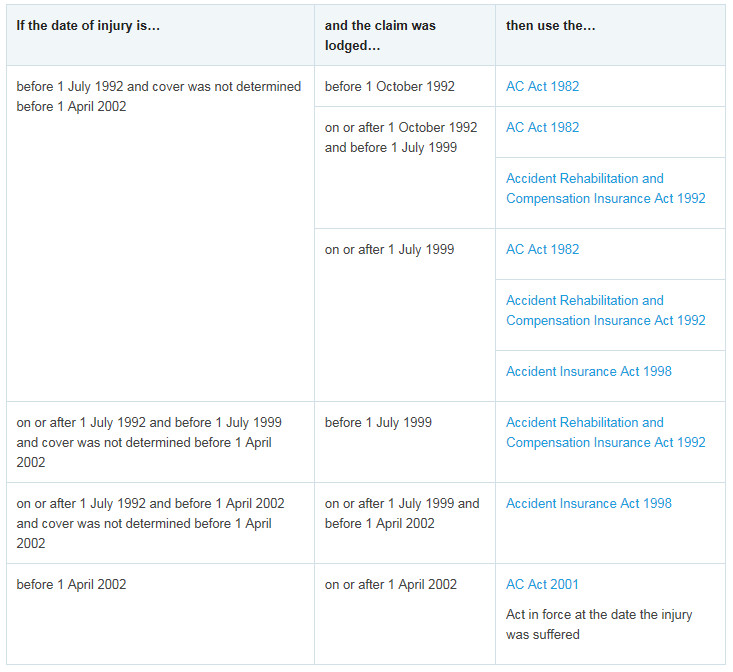
Which act to use.PNG
Accident Compensation Act 1982
https://www.westlaw.co.nz/maf/wlnz/app/document?
docguid=I88b2cb47e02711e08eefa443f89988a0&isTocNav=true&tocDs=AUNZ_NZ_LEGCOMM_TOC&startChunk=1&en
dChunk=1
Accident Rehabilitation and Compensation Insurance Act 1992
https://www.westlaw.co.nz/maf/wlnz/app/document?
docguid=Ia1048b58e02711e08eefa443f89988a0&tocDs=AUNZ_NZ_LEGCOMM_TOC&isTocNav=true
Accident Insurance Act 1998
https://www.westlaw.co.nz/maf/wlnz/app/document?
docguid=Ibad19b9ce02e11e08eefa443f89988a0&tocDs=AUNZ_NZ_LEGCOMM_TOC&isTocNav=true
Accident Compensation Act 2001
http://legislation.govt.nz/act/public/2001/0049/153.0/DLM99494.html
b If a claim for cover under a former Act is not lodged until on or after 1 April 2002, it will need to be considered under both the
2001 Act and the relevant Act that was in force when the personal injury occurred. See section 360 of the Accident Compen-
sation Act 2001.
Accident Compensation Act 2001, section 360
http://www.legislation.govt.nz/act/public/2001/0049/latest/DLM104164.html
3.0 Date of lodgement
a When determining the date of lodgement of a claim we do not need to have paid for the treatment or even formally accepted
the claim, but the client’s condition should have been medically diagnosed and the injury defined by ACC as a personal injury
caused by an accident.
b In the case of sensitive claims, the date of lodgement includes any record or receipt of counselling costs relating to that injury,
provided the treatment meets our requirements. See attached for further information.
ACC > Claims Management > Manage Claim Registration and Cover Decision > Operational Policies > Cover Decision > Which Act to Use Policy
Uncontrolled Copy Only : Version 10.0 : Last Edited Tuesday, December 24, 2019 7:47 AM : Printed Thursday, July 9, 2020 9:26 AM
Page 2 of 4
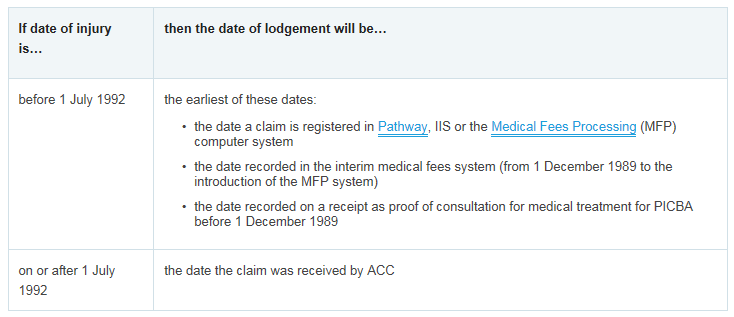
Date of lodgement further info.PNG
4.0 Incorrect cover decisions
a If we accepted a claim for cover under a former Act, and it was determined on or after 1 April 2002 that the decision to accept
the claim was incorrect under the previous legislation, then the decision can be revised and the personal injury is no longer
deemed to have cover under the Accident Compensation Act 2001.
5.0 Exclusions
a Gradual process injury before 1 April 1974
A client does not have cover for a personal injury caused by a work-related gradual process disease or infection (WRGPDI) if
they:
• suffered the personal injury because, before 1 April 1974, they performed a task or worked in an environment in the circums-
tances described in the Accident Compensation Act 2001, section 30(2)
• died before 1 July 1992.
See Work-related gradual process, disease or infection.
Work-related gradual process, disease or infection
https://go.promapp.com/accnz/Process/10f12b7d-cffc-4618-aa9f-a455d2d82984
b Treatment injury
See Cover criteria for treatment injury.
Cover criteria for treatment injury
http://thesauce/team-spaces/chips/cover/cover-decision/policy/treatment-injury-criteria-187/treatment-injury-cover/
index.htm
c Medical misadventure claims
These are claims for injury arising from treatment that were lodged before 1 July 2005. See Cover criteria for medical misad-
venture.
Cover criteria for medical misadventure
https://go.promapp.com/accnz/Process/657ef861-5438-4316-b2ae-56e0ca8abef5
d Work-related mental injury
(content currently under review)
e Late lodgement
Late lodgements are claims lodged with ACC more than 12 months after the accident causing injury or death. See attached for
further details.
ACC > Claims Management > Manage Claim Registration and Cover Decision > Operational Policies > Cover Decision > Which Act to Use Policy
Uncontrolled Copy Only : Version 10.0 : Last Edited Tuesday, December 24, 2019 7:47 AM : Printed Thursday, July 9, 2020 9:26 AM
Page 3 of 4
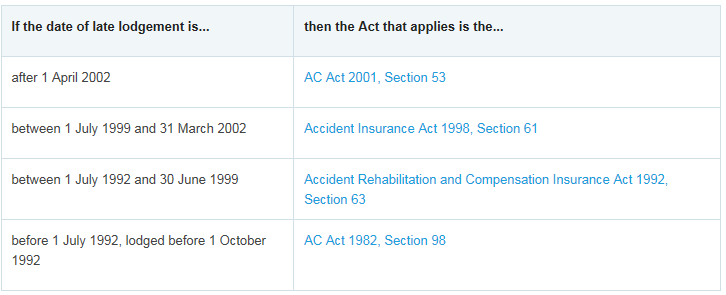
Late lodgement - which act..PNG
ACC > Claims Management > Manage Claim Registration and Cover Decision > Operational Policies > Cover Decision > Which Act to Use Policy
Uncontrolled Copy Only : Version 10.0 : Last Edited Tuesday, December 24, 2019 7:47 AM : Printed Thursday, July 9, 2020 9:26 AM
Page 4 of 4
 Working with the Code of ACC Claimants’ Rights Policy v1.0
Summary
Objective
Working with the Code of ACC Claimants’ Rights Policy v1.0
Summary
Objective
ACC and its agents have a legislative responsibility to provide the highest practicable standard of service and fairness to clients. In
order to fulfil our responsibilities, especially about our service, communication and behaviour you must understand you obligations
and responsibilities under the Code of ACC Claimants’ Rights.
See also Rules for managing complaints and Responsibility for managing complaints.
Owner
Luanne Razak
Expert
Lucy McKimm
Policy
1.0 Applying the Code of ACC Claimants’ rights
a When dealing with clients ACC must fulfil its obligations in the Code of ACC Claimants’ Rights (the Code).
Accredited employers and agents of ACC are subject to the Code and must provide the highest practicable standard of service
and fairness.
2.0 The Rights
a The Injury, Prevention, Rehabilitation, and Compensation (Code of ACC Claimants’ Rights) Notice 2002 specifies eight rights.
Clients have:
• the right to be treated with dignity and respect
• the right to be treated fairly and have their views considered
• the right to have their cultures, value and beliefs respected
• the right to a support person or persons
• the right to effective communication
• the right to be fully informed
• the right to have their privacy respected
• the right to complain.
See Behaviours to uphold the Code of ACC Claimants' Rights for a more in-depth guide to each right and staff obligations.
Behaviours to uphold the Code of ACC Claimants Rights
3.0 ACC philosophy
a You must comply with ACC's philosophy for dealing with client problems, concerns or complaints. This philosophy supports the
Code.
When a client raises a concern or complaint, you must:
• take the concern or complaint seriously
• commit to settling it in a fair, open and respectful manner
• resolve it as quickly as possible
• treat the client with courtesy
• keep the client informed at all stages
• take responsibility for working with the client until the issues are settled.
You must not discriminate against a client because they have raised a concern or complaint. Clients who raise a concern or file
a complaint must not be disadvantaged in any way.
Whenever possible, we should learn from feedback or complaints and find new ways of working if recurring issues or themes
are identified.
ACC > Claims Management > Manage Client Information > Operational Policies > Client rights > Working with the Code of ACC Claimants’ Rights Policy
Uncontrolled Copy Only : Version 1.0 : Last Edited Monday, February 25, 2019 8:40 AM : Printed Thursday, July 9, 2020 9:22 AM
Page 1 of 2
4.0 The purpose of the Code
a The purpose of the Code of ACC Claimants' Rights is to meet clients' reasonable expectations about how ACC should deal
with them. The Code provides a framework that enables us to deliver a high standard of service and fairness to clients. The
Code achieves these objectives by conferring rights on clients and imposing obligations on ACC.
5.0 The spirit of the Code
a The Code encourages positive relationships between ACC and clients. For ACC to assist clients, a partnership based on
mutual trust, respect, understanding and participation is critical. Clients and ACC need to work together, especially in the
rehabilitation process. The Code is about how ACC will work with clients to make sure they receive the highest practicable
standard of service and fairness.
6.0 Exceptions
a The ACC Code of Claimants’ Rights does not apply to:
• dealings with clients before 1 February 2003
• disputes about cover and entitlements, including treatment and compensation, which are addressed through the independent
review and appeal processes
• the provision of treatment services. Treatment services are covered by the Code of Health and Disability Services Con-
sumers’ Rights
• treatment and disability services purchased by ACC. Services purchased by ACC are covered by the Health and Disability
Sector Standards and the Health and Disability Services (Safety) Act 2001
• employee performance issues
• a person who is not a claimant, or who does not have an actively managed claim
The client has the right to review a decision made about their complaint under the Code of ACC Claimants’ Rights. However,
AC Act 2001, Section 149(3) prohibits any further appeal to the District Court against that review decision.
Customer Resolution can investigate matters that do not fall within the scope of the Code. In these cases we will issue a writ-
ten outcome which will not have review rights. However, if the client is dissatisfied with how we have handled their feedback
they can raise a further complaint with the Office of the Ombudsman.
Resolution Services
http://thesauce/about-acc/groups/operations-group/operations-services/resolution-services/index.htm
ACC > Claims Management > Manage Client Information > Operational Policies > Client rights > Working with the Code of ACC Claimants’ Rights Policy
Uncontrolled Copy Only : Version 1.0 : Last Edited Monday, February 25, 2019 8:40 AM : Printed Thursday, July 9, 2020 9:22 AM
Page 2 of 2
Document Outline













